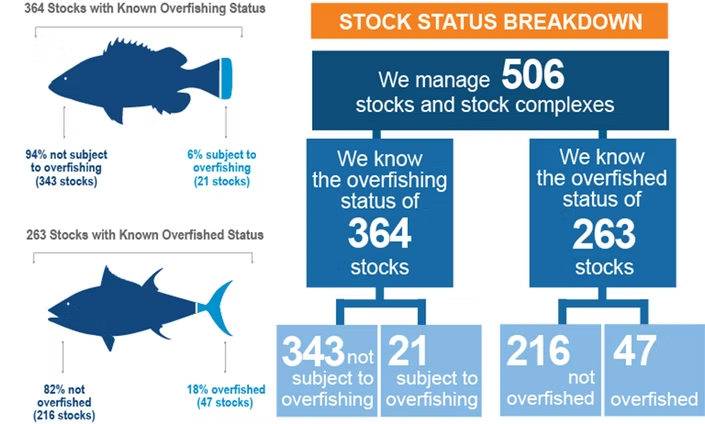Swimming Upstream: Financial Strategies to Pivot US Fisheries to Sustainability
- Dec 23, 2024
- 3 min read
Updated: Apr 7, 2025
Introduction
Commercial fishing is vital to the US economy, contributing billions of dollars annually and supporting millions of jobs. In 2022, the US commercial fishing industry harvested over 8.3 billion pounds of seafood valued at $5.9 billion. Beyond direct harvesting, the industry generated $183.4 billion in sales impacts, $47.2 billion in income, and $74 billion in value-added impacts, supporting 1.6 million jobs across the broader economy. However, as of the end of 2023, 47 fish stocks were classified as overfished, indicating a need for continued sustainable management practices. As a result, Responsible Alpha was engaged by a client to assess U.S. fisheries.
Given this, NOAA Fisheries launched its National Seafood Strategy: Implementation Plan in September 2024, describing a vision that:
US seafood continues to be harvested and produced sustainably.
The US seafood sector, which includes the full range of harvesting and processing sectors and seafood communities, contributes to the nation’s climate-ready food production, to food security, and to meeting critical domestic nutritional needs.
US seafood production increases to support jobs, the economy, and the competitiveness of the US seafood sector.
Supply chains and infrastructure are modernized with more value-added activity in the US.
Opportunities are expanded in order to build a diverse and growing seafood workforce.
Why It Matters
To address these risks to US fisheries, Responsible Alpha suggests:
Off-ramps for economically unsustainable fishers.
A fair and sustainable transition from an older generation of fisher (who were on the ground floor when the US quota era began). A quota is a federal permit under a limited access system to harvest a quantity of fish, expressed by a unit or units representing a percentage of the total allowable catch of a fishery that may be received or held for exclusive use by a person.
On-ramps for new entrants armed with the financial acumen and sensitivity to the changing ocean environment.
Details
In 2022, Responsible Alpha undertook an investigation of the economic challenges and tools available in the New England groundfish fishery and the Gulf of Mexico reef fisheries. Responsible Alpha conducted interviews and site visits in Cape Cod and the Islands, Maine, and Mississippi. Responsible Alpha also conducted remote interviews with thought leaders in the Alaska salmon fishery.
The results of this study focus on the decision-making processes around making investments in sustainable fisheries, and the factors affecting those decisions. Responsible Alpha conducted semi-structured interviews, and focus group discussions in the field. Responsible Alpha visited southern Maine, Cape Cod Massachusetts, and Biloxi, Mississippi (the latter on the occasion of a Gulf Fisheries Management Council meeting).
Responsible Alpha’s recommendations include:
Financial literacy would be high among fishers and financial tools are at their disposal to help to calculate the impacts of financial decisions.
Qualified fishers could more easily access loans through de-risking measures such as credit guarantees. Concessionary capital is secured alongside market-rate debt sources for high-risk transitions, using blended finance, loan guarantees, and investment in equity alongside debt.
NOAAs ecosystem-based fisheries management policy would provide opportunities for performance-based financial incentives linked to natural capital stewardship aligned with federal and state climate policies and incentives.
Variable energy costs would be managed through energy-efficient vessels, made possible through concessionary climate financing and a “cash for clunkers'' program for inefficient vessels.
Socio-economic impact beyond the direct earnings of the vessel, along with sustainability, would be addressed, e.g., measuring the economic impact on communities, in considering allocations of quota, consistent with ecosystem-based fisheries management principles and natural capital accounting.
Integrated food systems would facilitate the linkage of production and consumption at local scales.








Comments